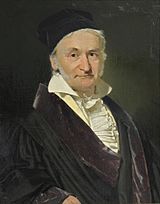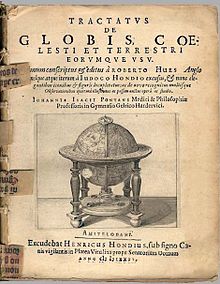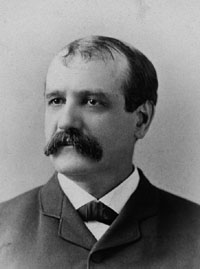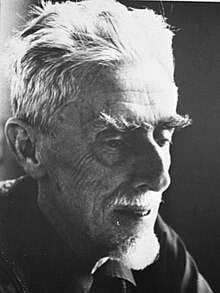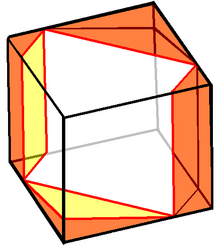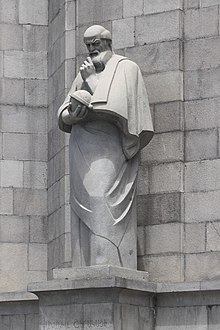Portal:Mathematics
The Mathematics Portal
Mathematics is the study of representing and reasoning about abstract objects (such as numbers, points, spaces, sets, structures, and games). Mathematics is used throughout the world as an essential tool in many fields, including natural science, engineering, medicine, and the social sciences. Applied mathematics, the branch of mathematics concerned with application of mathematical knowledge to other fields, inspires and makes use of new mathematical discoveries and sometimes leads to the development of entirely new mathematical disciplines, such as statistics and game theory. Mathematicians also engage in pure mathematics, or mathematics for its own sake, without having any application in mind. There is no clear line separating pure and applied mathematics, and practical applications for what began as pure mathematics are often discovered. (Full article...)
Featured articles –
Selected image –

Good articles –
Did you know (auto-generated) –

- ... that according to one critic, the math rock album Cryptooology by Yowie "sounds like an explosion in a Slinky factory"?
- ... that although the problem of squaring the circle with compass and straightedge goes back to Greek mathematics, it was not proven impossible until 1882?
- ... that in 1940 Xu Ruiyun became the first Chinese woman to receive a PhD in mathematics?
- ... that ten-sided gaming dice have kite-shaped faces?
- ... that Arithmetic was the first mathematics text book written in the Russian language?
- ... that mathematics professor Ari Nagel has fathered more than a hundred children?
- ... that the word algebra is derived from an Arabic term for the surgical treatment of bonesetting?
- ... that mathematician Mathias Metternich was one of the founders of the Jacobin club of the Republic of Mainz?
More did you know –

- ...that the identity elements for arithmetic operations make use of the only two whole numbers that are neither composites nor prime numbers, 0 and 1?
- ...that as of April 2010 only 35 even numbers have been found that are not the sum of two primes which are each in a Twin Primes pair? ref
- ...the Piphilology record (memorizing digits of Pi) is 70000 as of Mar 2015?
- ...that people are significantly slower to identify the parity of zero than other whole numbers, regardless of age, language spoken, or whether the symbol or word for zero is used?
- ...that Auction theory was successfully used in 1994 to sell FCC airwave spectrum, in a financial application of game theory?
- ...properties of Pascal's triangle have application in many fields of mathematics including combinatorics, algebra, calculus and geometry?
- ...work in artificial intelligence makes use of swarm intelligence, which has foundations in the behavioral examples found in nature of ants, birds, bees, and fish among others?
Selected article –
 |
| The real part (red) and imaginary part (blue) of the critical line Re(s) = 1/2 of the Riemann zeta-function. Image credit: User:Army1987 |
The Riemann hypothesis, first formulated by Bernhard Riemann in 1859, is one of the most famous unsolved problems. It has been an open question for well over a century, despite attracting concentrated efforts from many outstanding mathematicians.
The Riemann hypothesis is a conjecture about the distribution of the zeros of the Riemann zeta-function ζ(s). The Riemann zeta-function is defined for all complex numbers s ≠ 1. It has zeros at the negative even integers (i.e. at s=-2, s=-4, s=-6, ...). These are called the trivial zeros. The Riemann hypothesis is concerned with the non-trivial zeros, and states that:
- The real part of any non-trivial zero of the Riemann zeta function is ½
Thus the non-trivial zeros should lie on the so-called critical line ½ + it with t a real number and i the imaginary unit. The Riemann zeta-function along the critical line is sometimes studied in terms of the Z-function, whose real zeros correspond to the zeros of the zeta-function on the critical line.
The Riemann hypothesis is one of the most important open problems in contemporary mathematics; a $1,000,000 prize has been offered by the Clay Mathematics Institute for a proof. Most mathematicians believe the Riemann hypothesis to be true. (J. E. Littlewood and Atle Selberg have been reported as skeptical. Selberg's skepticism, if any, waned, from his young days. In a 1989 paper, he suggested that an analogue should hold for a much wider class of functions, the Selberg class.) (Full article...)
| View all selected articles |
Subcategories

Algebra | Arithmetic | Analysis | Complex analysis | Applied mathematics | Calculus | Category theory | Chaos theory | Combinatorics | Dynamical systems | Fractals | Game theory | Geometry | Algebraic geometry | Graph theory | Group theory | Linear algebra | Mathematical logic | Model theory | Multi-dimensional geometry | Number theory | Numerical analysis | Optimization | Order theory | Probability and statistics | Set theory | Statistics | Topology | Algebraic topology | Trigonometry | Linear programming
Mathematics | History of mathematics | Mathematicians | Awards | Education | Literature | Notation | Organizations | Theorems | Proofs | Unsolved problems
Topics in mathematics
| General | Foundations | Number theory | Discrete mathematics |
|---|---|---|---|
| |||
| Algebra | Analysis | Geometry and topology | Applied mathematics |
Index of mathematics articles
| ARTICLE INDEX: | |
| MATHEMATICIANS: |
Related portals
WikiProjects
![]() The Mathematics WikiProject is the center for mathematics-related editing on Wikipedia. Join the discussion on the project's talk page.
The Mathematics WikiProject is the center for mathematics-related editing on Wikipedia. Join the discussion on the project's talk page.
In other Wikimedia projects
The following Wikimedia Foundation sister projects provide more on this subject:
-
Commons
Free media repository -
Wikibooks
Free textbooks and manuals -
Wikidata
Free knowledge base -
Wikinews
Free-content news -
Wikiquote
Collection of quotations -
Wikisource
Free-content library -
Wikiversity
Free learning tools -
Wiktionary
Dictionary and thesaurus

